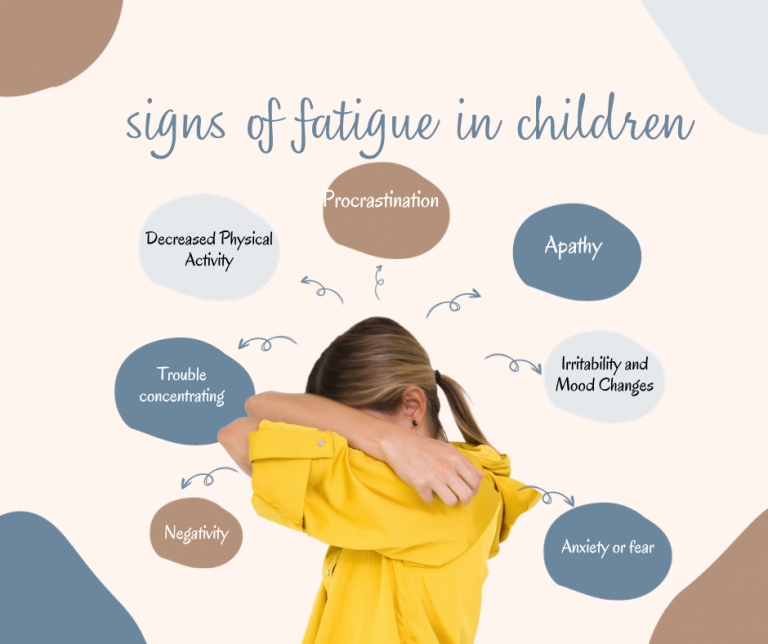
02 Oct How to Recognize Signs of Fatigue in Your Kid
Children are naturally curious and enthusiastic, always eager to explore their surroundings. It’s easy to ask how they could ever feel tired, but that’s until you notice signs of fatigue in them.
As adults, we tend to overlook the fact that children lead very active and mentally demanding lives. If there are no underlying health issues, paying attention to the various reasons why kids may feel exhausted is important.

Effects of fatigue in children
Fatigue can have various effects on children, such as:
• Fatigue can keep a child from staying motivated to work on challenges.
• Children may find it challenging to engage in physical activities, such as sports or playing outside, when they are tired.
• Fatigue can affect a child’s cognitive abilities, including concentration, memory, and problem-solving skills.
• They may become irritable, moody, or even more prone to temper tantrums when tired.
• Kids may withdraw from social situations due to exhaustion.
Signs of Fatigue For Your Kid
It may take several weeks or even months before parents notice a change in their child’s behaviour. Recognizing some signs of fatigue in children is necessary so parents can pay attention promptly and help them recover quickly.
1. Procrastination: Typically, your child quickly does his homework right after school. But now, your child is sluggish and takes a long time to get started. Your child even forgets his homework assignment and must be reminded often.
2. Apathy: Your child has lost interest in their surroundings and no longer enjoys going out to play, which used to be their favourite activity. You have tried asking your child which subject they enjoy the most, but they are unable to determine it.
3. Decreased Physical Activity: If your child is typically active but suddenly becomes lethargic or uninterested in physical activities they usually enjoy, it could be a sign of fatigue. Fatigue can slow down your child’s reaction time, making them less responsive to stimuli and potentially increasing the risk of accidents or injuries.
4. Trouble concentrating: Your child may have difficulty with attention, instructions, and tasks, leading to a decline in academic performance, such as lower grades, homework difficulties, and difficulty concentrating in school.
5. Irritability and Mood Changes: Fatigue can make children more irritable, emotional, and prone to mood swings. They may become easily frustrated or have meltdowns.
6. Negativity: Children no longer have a positive attitude when faced with problems to be solved. Your child often complains about things around him and finds everything challenging to reach.
7. Anxiety or fear: School has always been hard on your children. Kids feel worse at studying than their peers and become less confident. Ironically, extreme fatigue can make it difficult for some children to fall or stay asleep, leading to restless nights.

If you notice these signs of fatigue in your child, it’s important to investigate the underlying cause:
• Are you or anyone else scolding your kid frequently?
• Does your kid get bad grades at school? Is he upset?
• Is your child not excited about learning because teachers and friends criticize him?
• Are you setting expectations too high for your child that he can’t meet?
• Does your child catch up with lessons at school?
• Does your child get enough sleep?
You can talk to your child about your concerns so he or she can express his or her thoughts. From there, you can easily find out why your kid is tired.
Tips to prevent fatigue in children
Preventing fatigue in children is essential for their overall well-being and development. Here are some strategies to help prevent fatigue in children:
1. Ensure Adequate Sleep:
• You establish a consistent bedtime routine and ensure your child gets the recommended amount of sleep for their age group.
• Limit screen time is a must, especially before bedtime, as the blue light from screens can interfere with sleep.
2. Balanced Diet:
• Provide a balanced diet of fruits, vegetables, whole grains, lean proteins, and healthy fats.
• Ensure your child drinks enough water throughout the day to stay hydrated.
3. Physical Activity:
• It is essential to encourage regular physical activity but avoid excessive or overly strenuous exercise.
4. Promote Relaxation:
• Encourage relaxation techniques such as reading, drawing, or listening to soothing music to help your child unwind.

5. Lead by Example:
• It is a good idea for parents to model a healthy lifestyle by prioritizing their sleep, diet, and stress management. Your children will learn from you.
If your child continues to experience fatigue despite your efforts to prevent it, or if other concerning symptoms accompany fatigue, it’s essential to consult with a healthcare professional to rule out any underlying medical issues. Every child is unique, so what works best to prevent fatigue may vary from one child to another.
Conclusion
It’s important for parents and caregivers to be aware of the signs of fatigue in children and to take action to address it. Identifying and addressing any underlying causes of fatigue is crucial for a child’s overall health and well-being.
To avoid fatigue in children, it’s advisable to frequently observe and communicate with them to identify any potential problems at an early stage.


